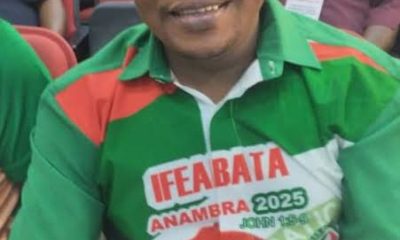News
House Advances Bill to Shield Judicial Officers from Prosecution

By Gloria Ikibah
The House of Representatives has progressed a bill aimed at amending the Code of Conduct Bureau and Tribunal Act, ensuring that judicial officers cannot be prosecuted before being lawfully removed from office. The bill passed its second reading during Thursday’s plenary session.
The bill which was originally introduced on April 30, 2024, sponsored by Rep. Solomon Bob (PDP-Rivers), seeks to amend sections 20 and 24 of the existing Act.
According to Rep. Bob, these amendments will safeguard judicial officers from arbitrary legal actions and premature removal.
A key provision in the bill stipulates that no judicial officer shall face prosecution before the tribunal unless they have been officially removed under Section 292 (1) of the Constitution.
Explaining the bill’s objectives, Rep. Bob emphasised the need to reinforce judicial independence by ensuring that disciplinary measures follow due process. He highlighted proposed modifications to Section 20, stating that the Code of Conduct Tribunal should be recognized as a superior court of record with exclusive jurisdiction over offences under the Act.
Additionally, amendments to Section 24 introduce new subsections (5 and 6) to further strengthen judicial protections.
He said: “Nothing in this Act shall permit the commencement of any action against a Judicial Officer before the Tribunal unless such Judicial Officer has been validly removed from office under section 292 (1) of the Constitution.
“Any action seeking to prosecute any Judicial Officer in contravention of sub-section (5) of this section shall not be entertained by the Tribunal.
“It is axiomatic that in a presidential system the three arms of government are separate and independent of one another; each with its powers constitutionally determined. Under our constitution, their powers are created by sections 4, 5, & 6 for the Legislature, Executive and Judiciary respectively.
“The constitution evinces that each arm of government will discharge its responsibilities without interference from the other arms.
He explained further that: “The Code of Conduct Tribunal which is the crux of this bill is a body with statutory judicial powers to try and sanction public office holders found to be in breach of the Code of Conduct Bureau Act. The powers of the Tribunal are pursuant to section 24 of the Principal Act – The Code of Conduct Bureau and Tribunal Act.
“The constitution has made very clear provisions for removal of elected officials including judicial officers. The obvious intention is to obviate the threat of arbitrary removal from office, thereby safeguarding the sanctity of the office and affording the office holders the necessary leeway to discharge the functions of their office without fear of being victimized.
“For Judicial officers, the procedure or process for their removal from office is as enunciated in section 292 of the Constitution of the Federal Republic of Nigeria, 1999. Section 292(1) requires that the removal of a Head of Court by the President or the Governor, as the case may be, must be upon an address by the relevant Legislative House. And in any other case (i.e. Judicial officers other than Heads of Court) by the President or Governor, as the case may be, acting on the recommendation of the National Judicial Council. It is pertinent to note that in both cases, the bases of such removal are incapacity (whether arising from infirmity of mind or body), misconduct or contravention of the code of conduct.
“For ease of reference, section 292(1) of the Constitution is reproduced hereunder: “A judicial officer shall not be removed from his office or appointment before his age of retirement except in the following circumstances.
“Mr. Speaker, Honourable Colleagues, this proposed amendment aims at securing the sanctity of the office of judicial officers, their tenure, freedom from arbitrary interference and harassment, and to ensure that no judicial officer is put on trial except after having been lawfully removed from office in strict compliance with section 292 of the Constitution.
“This Bill will enhance the rule of law and invariably deepen our democracy. I, therefore, with utmost respect, urge it upon you my very dear colleagues”.
Lawmakers engaged in a heated debate over the bill, while some argued for maximum protection, others questioned why immunity is granted to the executive but not the judiciary.
Rep. Peter Ifeanyi supported stronger safeguards for judicial officers but cautioned against granting blanket protection to those who might abuse their positions. He clarified that the term “immunity” was causing confusion and suggested a more precise definition.
Rep. Kalejaye Paul, however, expressed concerns that the bill contradicts constitutional provisions. He argued that rebranding “immunity” as “protection” does not change the bill’s underlying intent. Stressing the Code of Conduct Tribunal’s role in holding public officials accountable, he warned that altering constitutional processes could create loopholes for other sectors to seek similar privileges.
Rep. Sada Soli pointed out that Section 292 of the Constitution already provides safeguards for judicial officers in the performance of their duties. He criticized the trial of a former Chief Justice of Nigeria (CJN) at the Code of Conduct Tribunal without first passing through the National Judicial Council (NJC), calling it a breach of due process. According to him, the bill simply aims to establish a proper legal framework for handling disciplinary actions against judicial officers.
Presiding over the session, Deputy Speaker Benjamin Kalu noted that Rep. Soli’s explanation had clarified the bill’s intent, allowing members to make informed decisions. The bill was subsequently put to a vote, approved for second reading, and referred to the House Committees on Anti-Corruption and Justice for further consideration.
News
Nigeria Felicitates with South Africa on 31st Freedom Day Anniversary

By Gloria Ikibah
Nigeria has congratulated South Africa on the celebration of its 31st Freedom Day anniversary, marking more than three decades since the end of apartheid rule.
This was contained in a statement issued by the Ministry of Foreign Affairs, on Sunday in Abuja, the Minister, Ambassador Yusuf Maitama Tuggar, extended warm greetings to his South African counterpart, His Excellency Ronald Lamola, Minister of International Relations and Cooperation.
Ambassador Tuggar described the day as a reminder of the historic victory of democracy over apartheid and a celebration of the resilient and unified spirit that continues to shape South Africa’s journey.
“Nigeria and South Africa share a profound bond forged through decades of solidarity in the liberation struggle. As we reflect on this milestone, we recall Nigeria’s unwavering support for the anti-apartheid movement, including diplomatic, material, and moral contributions that underscored our commitment to justice and the ethos of pan-Africanism,” the statement read.
Highlighting the strong bilateral ties between the two countries, Tuggar emphasized the shared responsibility Nigeria and South Africa have in promoting peace, security, and inclusive development across the African continent.
He noted that as Africa’s two largest economies and democracies, there is a need to strengthen collaboration in areas such as trade and investment through the African Continental Free Trade Area (AfCFTA), as well as cultural exchanges and youth empowerment.
“Therefore, on this Freedom Day, we stand with South Africa in honouring the sacrifices of heroes like Walter Sisulu, Nelson Mandela, Govan Mbeki, Thabo Mbeki and recommit to working together to realize the vision of a prosperous, peaceful, and united Africa,” he added.
News
Enugu Reps caucus backs concessioning of Enugu airport
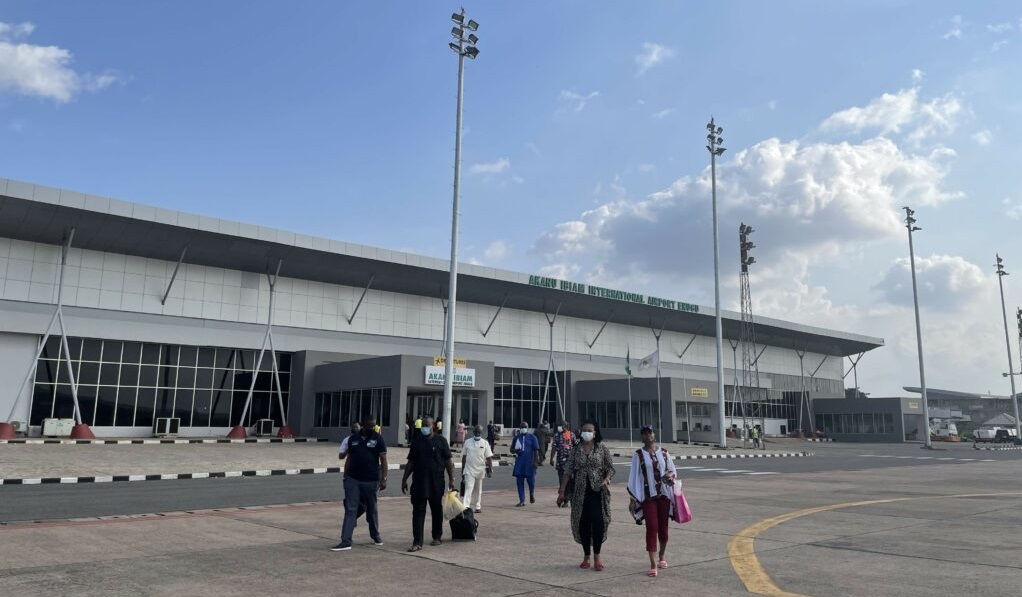
The Enugu Caucus in the House of Representatives has thrown its weight behind the Federal Government’s plan to concession the Akanu Ibiam International Airport, Enugu, describing it as a potential catalyst for the Southeast economy.
The caucus commended the Federal Government for the initiative and urged it to hasten the process to enable the people of the Southeast and the nation to benefit from it in earnest.
It also called on the people of the region to support the concession as the only way to guarantee sustainable investment to fully develop the airport into a truly international facility.
News
Vatican: Conclave to elect a new pope will start on May 7
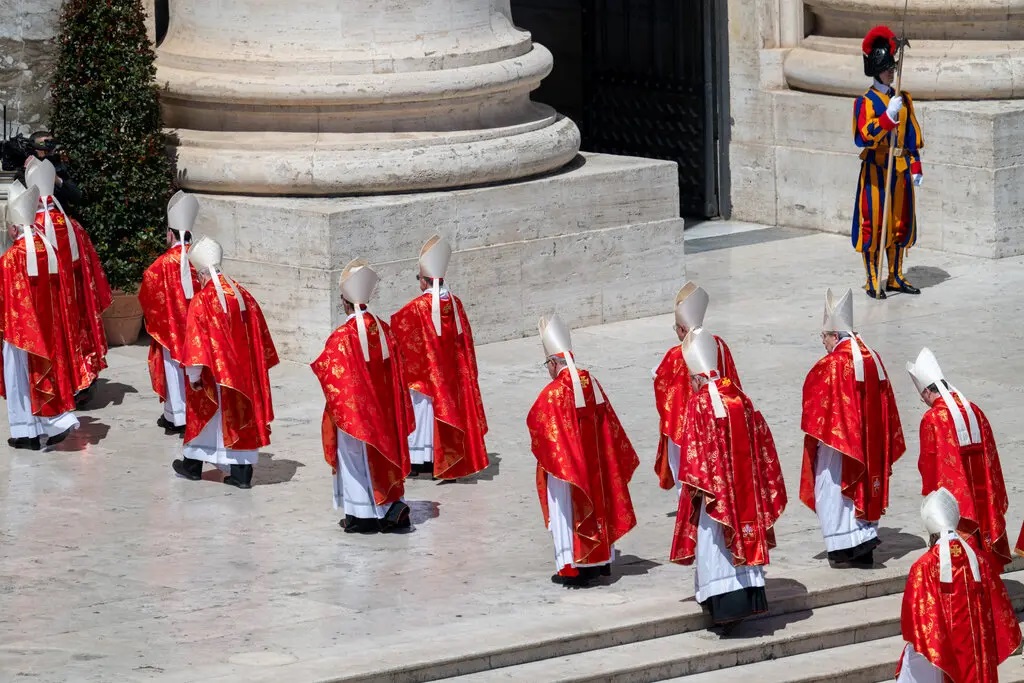
Cardinals will meet next month in a secret conclave to elect the next pope, the Vatican has said.
The closed-door meeting will start inside the Sistine Chapel on 7 May and will involve some 135 cardinals from across the world.
It follows the death of Pope Francis who died at the age of 88 on Easter Monday and whose funeral was held on Saturday.
There is no timescale as to how long it will take to elect the next pope, but the previous two conclaves, held in 2005 and 2013, lasted just two days.
Vatican spokesman Matteo Bruni said cardinals will take part in a solemn mass at St Peter’s Basilica, after which those eligible to vote will gather in the Sistine Chapel for the secretive ballot.
Once they enter the Sistine Chapel, cardinals must have no communication with the outside world until a new Pope is elected.
There is only one round of voting on the first afternoon of the conclave, but the cardinals will vote up to four times every day afterwards.
A new pope requires a two-thirds majority – and that can take time.
Each cardinal casts his vote on a simple card that says, in Latin: “I elect as Supreme Pontiff” to which they add the name of their chosen candidate.
If the conclave completes its third day without reaching a decision, the cardinals may pause for a day of prayer.
Outside the Sistine Chapel the world will be watching for the smoke from the chimney.
If the smoke is black, there will be another round of voting. White smoke signals that a new pope has been chosen.
On Saturday, politicians and royalty joined thousands of mourners as Pope Francis’ funeral was held in St Peter’s Square.
Hymns played out on giant speakers, occasionally drowned out by the sound of helicopters flying overhead, before 91-year-old Cardinal Giovanni Battista Re gave a homily on the pope’s legacy.
After a ceremony, huge crowds lined the streets of Rome to watch as the Pope’s coffin was carried in a procession to his final resting place, Santa Maria Maggiore Basilica.
Authorities said 140,000 people had lined the streets, clapping and waving as the hearse – a repurposed white popemobile – crossed the Tiber river and drove past some of Rome’s most recognisable sights: the Colosseum, the Forum and the Altare della Patria national monument on Piazza Venezia.
On Sunday images of Pope Francis’s tomb at the church were released showing a single white rose lying on the stone that bears the name he was known by during his pontificate, below a crucifix illuminated by a single spotlight.
-

 News10 hours ago
News10 hours agoJust in: Senator Natasha tenders satirical ‘apology’ to Akpabio
-

 News5 hours ago
News5 hours agoInsecurity: BUDA urges govt to quickly rescue Baruten from terrorists
-

 News7 hours ago
News7 hours agoUNUSUAL! Without invitation, Police declared me wanted — Daughter of ABC Transport owner
-
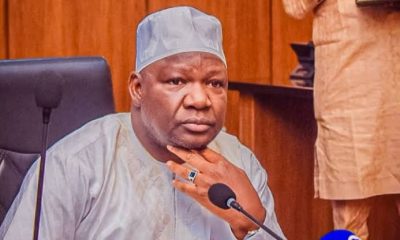
 News3 hours ago
News3 hours agoWeeks to 2nd anniversary, Niger deputy gov, plans to resign, move out personal effects
-

 News19 hours ago
News19 hours agoBenue LG chairman gives Fulanis 48hrs to leave all farmlands
-
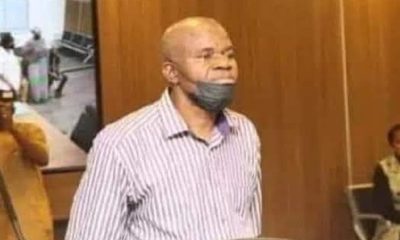
 News1 hour ago
News1 hour agoBreaking: Late gospel singer Osinachi’s husband sentenced to death by hanging
-

 News19 hours ago
News19 hours agoFive suspected kidnappers eliminated by police in Delta
-

 Metro12 hours ago
Metro12 hours ago‘My husband always makes love throughout the night until morning’ – Woman Wants Divorce


